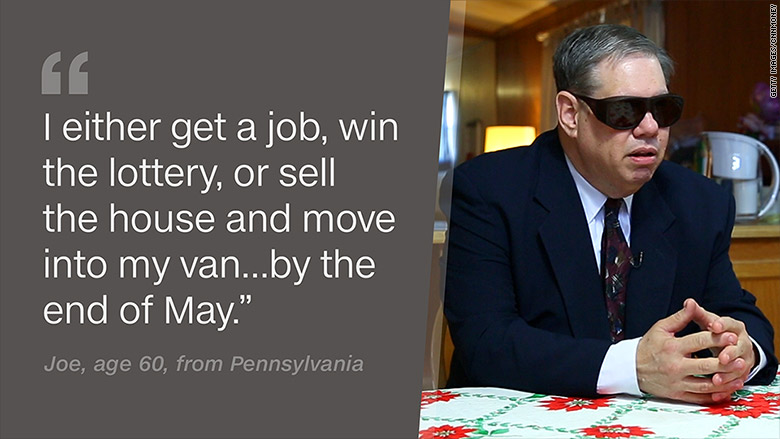How I went from middle class to homeless

Trash bags and boxes fill Joe's mobile home in a Philadelphia suburb. This isn't spring cleaning. Joe is about to become homeless.
Unless "a miracle happens," Joe will likely live in his 2001 Chevrolet Venture minivan by the summer. He removed the seats in the back to make space for a sleeping bag, his laptop and some clothes.
Soon to turn 61, Joe never imagined he would be in this position.
"When I was a kid growing up…America was the greatest place on planet earth. We were the envy of the civilized world. I never thought this could happen here," Joe says. CNNMoney agreed not to use his last name because he worries potential future employers will Google him.
Joe's big fear is that people assume he's lazy. He wore a suit for his interview with CNNMoney and hid his eyes behind big dark glasses because he is ashamed his life has come to this.
Joe's worked all his life, starting at age 11 pushing a broom around an uncle's shop. He earned two associate's degrees in electrical engineering technology and mechanical engineering technology and built a "blue collar" career as a technician, tester and machine operator. He loves factories and figuring out how things work.
Trump talks often about manufacturing job losses
When manufacturing jobs dried up in southeastern Pennsylvania, Joe moved to Minnesota. By the late 1990s, he earned $15 an hour, what he dubs a solid "lower middle class" wage. He figured he would work his way up, get a few raises and maybe buy a home. The American Dream seemed within reach.
Then his mother got sick. As the oldest child, he moved back to Pennsylvania in 1999 to care for her. Never married, Joe bought a trailer home with his mother. He managed to get jobs through temp agencies, but the work was never steady. He never earned $15 again.
Since being laid off in April 2013 from a manufacturing job, he's worked on and off a total of only seven months. He has drained his savings and retirement accounts and his mother is now in a nursing home, funded by what remains of her life savings and Medicaid.
Presidential candidate Donald Trump, a heavy favorite to win Pennsylvania, brings up the plight of people like Joe often in his stump speeches. He recently pointed out that the Keystone state has lost "35% of its manufacturing jobs since 2001."

Older job seekers seen as 'unemployables'
Joe is hit by a double-whammy: his age and his blue-collar career. Workers over 50 have been dubbed the "new unemployables."
Still hopeful he'll get a job, Joe applies to a few positions a week. His barber acts as his recruiter, asking everyone who comes in the shop if they have heard of openings and will call Joe right away when he gets news.
"Yes, I am an older worker, but my life's worth of experience could make me an asset to many places if I could only get the chance to show them," Joe says. The few interviews he's had are short. He feels no one wants to hire "the old guy."
Joe's mobile home is paid off, but he owes $483 a month for the lot rent in the mobile home park. He doesn't have the money for May or beyond.
The hurting economy
Joe is one of 8 million unemployed Americans who remain without work despite a hiring surge in recent years.
The hurting economy still exists. Perhaps the most telling sign that the U.S. isn't back to normal is the 44.7 million Americans on food stamps. Joe is one of them, something else he never envisioned in his life.
Before the financial crisis there were only 26.3 million people on food stamps.
Политика конфиденциальности | Правила пользования сайтом








